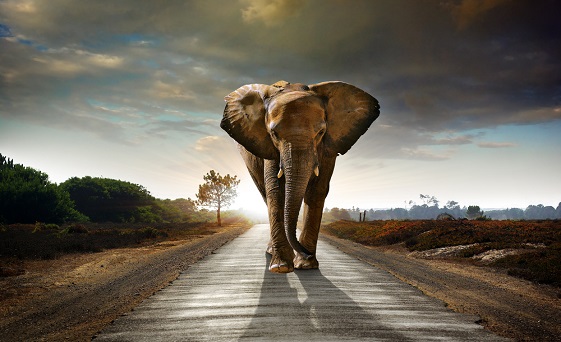
If spring is, as the poets tell us, a season of rebirth, then it stands to reason that autumn is a season of death. November is when Christians observe All Souls' Day, the "Day of the Dead," celebrating the souls of the faithful departed. It's also the month that brings with it the most dead leaves, and probably the most dead turkeys as well. But a lot of what you think you know about death in the natural world is "gravely" mistaken. Ken Jennings, of Jeopardy! fame, is with us all month to debunk a lot of myths about our furry friends who encounter the undiscovered country…or at least a "farm upstate."
The Debunker: Do Dying Elephants Go to an "Elephant Graveyard"?
The legend of the elephants' graveyard—a place old elephants head toward when they sense Time's wingéd chariot hurrying near—goes back at least to the tales of Sinbad the Sailor. As Europeans colonized Africa in the 19th century, the myth of these jungle bone-piles became a kind of El Dorado for eager ivory hunters, and elephants' graveyards were cemented into the public consciousness in movies from Johnny Weissmuller's Tarzan and His Mate to Disney's The Lion King.

The origin of these stories isn't hard to guess. Elephant intelligence (intelephence?) is indeed among the sharpest in the animal kingdom. Elephants have been observed to use tools, perform mental arithmetic, self-medicate using tree leaves, mimic other animal sounds and even human speech, and altruistically help animals of other species. One of their most remarkable behaviors is a death ritual: they congregate around fallen elephants, mourn vocally, and cover their comrades' bodies with dirt and leaves.
Observing something like that, you can see how African tribes and visiting naturalists might have speculated about elephant burial grounds. And I'm sure there have been cases where large collections of elephant bones were found together when dying elephants clustered around likely food or water sources in times of famine or drought. But just because a species holds funerals doesn't mean they also have ancestral memory of graveyards. "There is no reason to think that elephants have graveyards, where old animals go to die," BBC science author Henry Nicholls has written.
Ironically and tragically, the notion of an elephants' graveyard has started to come true in recent years. Poachers in places like Zimbabwe's Hwange National Park have littered the grassland with elephant corpses by poisoning watering-holes with cyanide. Hundreds of elephants have died in these attacks. Any "elephant graveyards" that exist in Africa today have us, human beings, to thank as their undertakers.
Quick Quiz: What band hired the USC Trojan marching bad to play on their 1979 single "Tusk"?
Ken Jennings is the author of twelve books, most recently Planet Funny and co-hosts the most important podcast in human history, Omnibus. He's also the proud owner of an underwhelming Bag o' Crap. Follow him at ken-jennings.com or on Twitter as @KenJennings.
